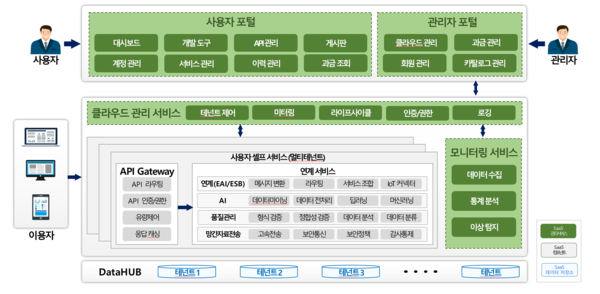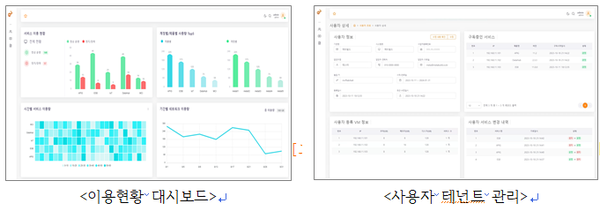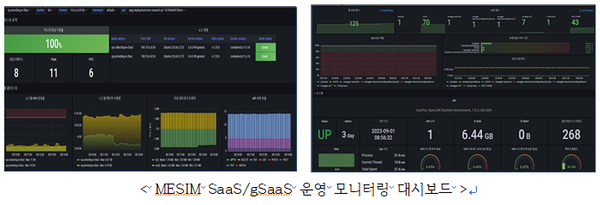- Press release

Metabuild enhances data connection and integration services through MESIM SaaS/gSaaS
Metabuild, a company specializing in
artificial intelligence (AI) and related software (SW) products, is actively
expanding the cloud-based software market by launching MESIM SaaS/gSaaS.
"MESIM SaaS/gSaaS" provides
Metabuild's integrated middleware (ESB/APIG/mHUB/IoT) as a subscription-type
software (SaaS) by applying Cloud Native technology. As the company
transitioned from an existing on-premise-based installation product to the
cloud, it optimized performance, scalability, security, monitoring, etc. for
the cloud environment. Compared to the integrated software provided in the
existing on-premise environment, it can reduce the cost of building and
maintaining the infrastructure of customers and increase operational
efficiency.
Cloud native technology refers to an
architecture and development methodology optimized for a cloud environment.
Cloud native technology is a technology approach that helps companies lead
innovation faster and more agile in traditional IT environments and maximize
business performance. For the introduction of cloud-based services, it is
essential to understand and utilize cloud native technology.
'MESIM SaaS/gSaaS' provides flexible
scalability by applying container-based MSA technology. Since it is
cloud-based, customers can easily introduce connection and integration SW
without building a separate infrastructure.
By providing a Kubernetes-based container
operation environment, it can operate in the same way in various cloud
environments. By applying Metabuild's AI anomaly detection model, it
automatically detects linkage-related failures occurring in distributed
environments and notifies managers of them, supporting stable service
operation.
'MESIM SaaS/gSaaS' consists of a user and
manager portal, a cloud management service for controlling and managing cloud
native applications, and a monitoring service. The user portal provides a
function to access through various platforms to organize a related service, and
to check billing and monitor the status of the connection.
The development tool of the user portal
supports the creation and expansion of linked services without separate coding
by organizing and deploying various linked components with linked configuration
wizards and modeling functions to easily and quickly develop linked services.
The API management function of the user portal is a function to provide
developed services to external organizations in the form of an open API, and
provides functions such as authentication, authority, flow control, and caching
to stably handle traffic generated from outside.
The manager portal provides various
management functions such as user information, usage, billing inquiry, and
cloud service information management. The manager portal monitors the
operational status of tenants operating in the cloud and resource usage, and
controls user tenants in fault or abnormal conditions so that the cloud
environment can be operated stably. In addition, excessive traffic is prevented
by controlling the user's access to use the cloud according to the amount of
usage and billing status allocated to the user.

Cloud management services configure and
control user tenants in a cloud-native environment, and generate and collect
metering data necessary for billing in the associated services constituting the
tenants. User tenants selectively configure necessary associated services as
user-centered request-based self-service in conjunction with user and manager
portals, and operate in a container-based multi-tenant environment.
The monitoring service collects system
logs, associated logs, resource usage, events, and metrics generated in the
cloud, and uses the collected data to determine whether there is an abnormality
in the cloud operating environment on the monitoring screen of the user and
manager portal. The collected data analyzes the user's cloud service usage
pattern through the statistical analysis function to predict the necessity of
expanding cloud resources and the possibility of failure and notify the user.

Recently, as cloud native support projects
for the implementation of the digital platform government increase, the public
cloud SaaS market is expected to continue to grow in the future. The digital
transformation of governments and public institutions is accelerating, and
private cloud technology and accumulated experiences are permeating into the
digital platform government. It is expected that the government will be able to
provide better services to customers as it is pursuing various policies at a
rapid pace to revitalize the public cloud SaaS market.
According to Metabuild, the MESIM
SaaS/gSaaS service is currently being used by many organizations, including KT
MyData, the Ministry of Education's Intelligent NEIS, Incheon International
Airport Corporation, and the KEENEAT music service.
The company is also pursuing a Cloud Security Assurance Program (CSAP) procedure organized by the Korea Internet & Security Agency (KISA) to strengthen the security of 'MESIM SaaS/gSaaS', and plans to obtain certification within this year and provide customers with a safer and more reliable cloud-based linked integrated service.
Published: 01 Nov, 2023



